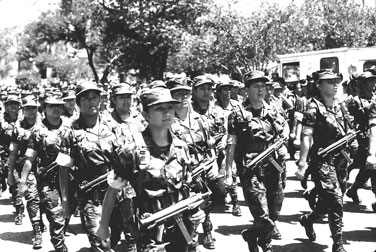Woman's place in modern world
.jpg) The celebrated Greek philosopher Plato believed that there should be
equality of opportunity in employment for both men and women. Strangely,
he thanked God that he had been born a man! Another Greek philosopher
Aristotle saw woman as nature's failure to make a man. He did not think
that woman was worthy of taking part in public affairs. Even ancient
Jews did not celebrate the birth of a daughter. The celebrated Greek philosopher Plato believed that there should be
equality of opportunity in employment for both men and women. Strangely,
he thanked God that he had been born a man! Another Greek philosopher
Aristotle saw woman as nature's failure to make a man. He did not think
that woman was worthy of taking part in public affairs. Even ancient
Jews did not celebrate the birth of a daughter.
After more than five centuries since then the position of woman has
undergone drastic changes. However, the changes came slowly and
steadily. Many revolutions promised to give her liberty and the right to
vote. After the revolutions men completely forgot them. Some
philosophers such as Schopenhauer referred to women as an "under-sized,
narrow-shouldered, broad-hipped, and short-legged race." He condemned
women probably because he had been jilted by a pretty Venetian girl!
Women received some measure of freedom only in the 20th century. With
the new-found freedom they began to assert themselves in almost every
field of activity. They took to law, medicine, accountancy and
engineering in a big way. Some strong-willed women stormed the male
bastions such as the police, army, navy, and air force. Although they
could not match male physical strength, women made up their minds not to
play second fiddle to men.
Modern woman has acquired a penchant for freedom and power. Today man
cannot get away easily if he beats his wife. Women hold high positions
in the legislature, judiciary, and police. They are no longer the docile
housewives who patiently wait for the return of their husbands from
work.
Most women now imitate men. Some of them drink hard liquor, smoke and
play cards. They dress like men and sometimes you do not know whether
you are sitting next to a man or a woman! Most of these changes came
some time after the Industrial Revolution in the West.
During the first phase of the Industrial Revolution, factory owners
preferred to employ women and children. Male labour was relatively more
expensive than woman and child labour. When women became economically
independent, men lost their control over them. This marked the initial
phase of the women's liberation movement.
 |
|
Women have stormed male
bastions such as the army |
The working woman got rid of her household chores little by little.
Industrialists invented machines to help her in cooking, washing, and
keeping fit. Gas cookers, refrigerators, microwave ovens and washing
machines invaded the household. As a result, modern woman settled
herself to a sedentary lifestyle paying more attention to her good
looks. Many gymnasia and beauty parlours sprang up in the city to help
women to be in good shape.
In the heyday of our hydraulic civilisation during the Anuradhapura
and Polonnaruwa kingdoms, parents welcomed more children to their fold.
They were necessary to work in fields and farms. However, the scene
changed after the Industrial Revolution. Today's parents do not welcome
more than one or two children because they lead a hectic life in the
city. Moreover, modern flats and apartments are not meant for large
families. With the blessings of the government birth control methods are
widely practised to check the population boom.
The emancipated woman is the product of the age we are living in.
Instead of criticising her for what she is, we need to look at her
with some degree of impartiality. After all, women are our mothers,
sisters and daughters. However, woman's emancipation is not without
problems.
History tells us that ancient Romans were filled with horror at the
prospect of getting married to a learned woman. The position seems to
remain the same even today. Very few men would opt to marry a woman who
is equally or more qualified than them. This is because most men resent
women "trespassing" upon their territories. If you glance through the
marriage proposals in newspapers, you will notice that most women who
look for partners are highly educated professionals. One unmarried
postgraduate student said,"Why is that no one wants to marry me? Most
men love very insignificant women."
Despite proliferating spas, gymnasia and beauty parlours, modern
woman in the city is no match for a village damsel helping her father or
husband in agricultural pursuits. Some of our grandmothers in rural
areas have no problems with their vision or hearing. While the rural
woman is ready to deliver her baby in the most natural way, her city
counterpart has to go for a Caesarian operation.
Human civilisation marches forward whether you like it or not. The
changes taking place in the social fabric cannot be halted or reversed.
Even if you are not a wayside philosopher, you can watch the passing
scene with amusement and curiosity.
|

